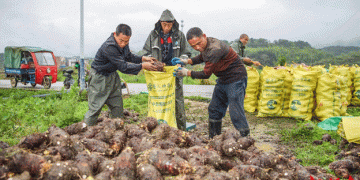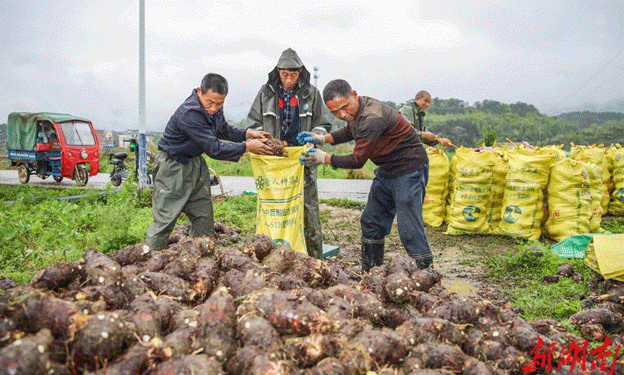Over the past few years, Hunan’s vegetable industry has experienced a remarkable growth spurt. What was once considered a low-end sector is now a thriving market that feeds the high-demand regions of Guangdong, Hong Kong, and Macao, while also expanding to international markets. Through a combination of strategic partnerships, technological advancements, and industry standardization, Hunan has positioned itself as a key player in China’s vegetable export market.
In 2023, the city of Yongzhou, located in the heart of Hunan, led the nation in vegetable export value at the municipal level, with a 61-fold increase in export figures over the last decade. In fact, Hunan’s vegetables now account for more than half of the vegetables exported to Hong Kong, showcasing the effectiveness of the province’s efforts to elevate its agricultural products.
Innovating from Seed to Market: Key Steps in Transformation
The first challenge Hunan’s vegetable industry faced was the lack of quality seed varieties, which led to inconsistent product quality and a poor reputation in the market. For years, vegetables from the region were seen as cheap, low-end products, making it difficult to compete in higher-end markets.
To overcome this, Hunan’s agricultural leaders focused on improving seed quality. In collaboration with leading institutions like the Chinese Academy of Agricultural Sciences and Hunan Agricultural University, Yongzhou created two national-level and 10 provincial-level vegetable research bases. As a result, the coverage rate of high-quality vegetable seeds in the region has exceeded 95%. This shift has been crucial in elevating the value of Hunan’s vegetables and increasing yields, with the per-acre value of vegetables in Yongzhou rising from 4,767 yuan in 2019 to 6,774 yuan in 2023.
Additionally, the region’s commitment to technology has played a pivotal role. Modern farming techniques, including precision irrigation and integrated pest management, have made production more efficient while maintaining high product quality. Farmers now use smart agricultural apps to monitor water and fertilizer use, which not only conserves resources but also improves crop health and yields.
From Fresh Produce to Processed Goods: Adding Value to the Supply Chain
One of the key factors behind the rise of Hunan’s vegetable industry is its focus on processing. By moving beyond fresh vegetables to value-added products, such as frozen, dried, and pre-packaged goods, Hunan has created a thriving processing industry that significantly boosts product value.
In Jiangyong County, for example, the Jiangyong Five-Spice Food Co. processes 30 tons of taro daily, turning it into snacks, chips, and other products. These processed goods have expanded into markets across China and abroad. The value-added products coming out of these processing plants have seen their prices double compared to fresh vegetables, allowing farmers and businesses to capture higher profits. In total, the processed vegetable sector in Yongzhou has reached an annual output value of over 31 billion yuan, contributing significantly to the region’s economy.
Furthermore, standardization has become a key focus. The region has implemented over 50 vegetable-related technical regulations and local standards, making it easier for farmers and processors to meet the quality requirements of both domestic and international markets. Hunan has set up over 40 standardized vegetable production bases and achieved a remarkable 98% compliance rate for vegetables exported to the Greater Bay Area.
Expanding to Global Markets: A New Era for Hunan’s Vegetables
The export potential of Hunan’s vegetable industry has been maximized thanks to both its focus on quality and its streamlined logistics operations. Last year, the province reached a major milestone, with more than half of China’s vegetable exports to Hong Kong coming from Hunan. This success has been driven by efficient logistics and export channels, such as the “cross-region direct supply” model and the establishment of cold chain logistics networks.
In 2023, Hunan’s vegetable export value exceeded 10 billion yuan, with significant contributions from cities like Yongzhou and Jianghua. The province has also expanded its market reach to Southeast Asia, the Middle East, and Europe, highlighting the growing international demand for its produce.
To support this international expansion, the local government has provided financial incentives for vegetable exporters, including a special fund of 2 billion yuan. This funding is helping companies scale up and develop new export markets while ensuring that they meet international quality standards. In addition, the introduction of the “vegetable loan” program has provided financial support for the entire vegetable supply chain, from cultivation to transportation.
A Model for Agricultural Growth and Innovation
Hunan’s vegetable industry serves as a model for other regions looking to transform their agricultural sectors. Through a combination of high-quality seed development, technological innovations, industry standardization, and a focus on value-added processing, the province has dramatically increased its vegetable production and expanded its global market share. As Hunan continues to innovate and improve, its vegetable industry will remain a key player in China’s agricultural future, bringing more sustainable and profitable opportunities for farmers, businesses, and the economy as a whole.































